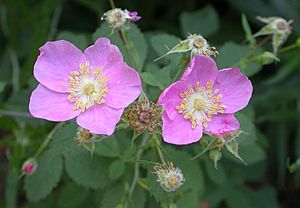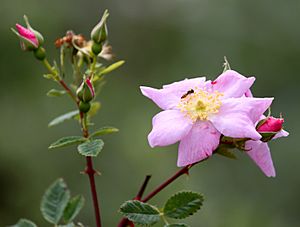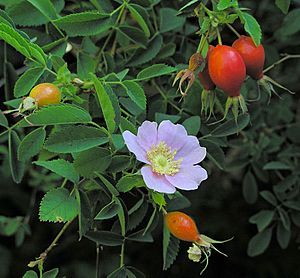California wildrose facts for kids
Quick facts for kids California wildrose |
|
|---|---|
 |
|
| Scientific classification |
|
| Kingdom: | Plantae |
| Clade: | Tracheophytes |
| Clade: | Angiosperms |
| Clade: | Eudicots |
| Clade: | Rosids |
| Order: | Rosales |
| Family: | Rosaceae |
| Genus: | Rosa |
| Species: |
R. californica
|
| Binomial name | |
| Rosa californica Cham. & Schldl.
|
|
| Script error: The function "autoWithCaption" does not exist. | |
Script error: No such module "Check for conflicting parameters".
Rosa californica, also known as the California wildrose or California rose, is a type of rose plant. It grows naturally in parts of the United States, specifically California and Oregon. You can also find it in the northern part of Baja California, Mexico. This rose often grows in areas with chaparral and woodlands or in the foothills of the Sierra Nevada mountains. Even though it can survive dry weather, it grows best in wet soil near water.
Contents
What Does the California Wildrose Look Like?
The California wildrose is a bush that can grow into a thicket. It has stems that are prickly and curve. The flowers smell very nice. They can grow alone or in groups of several blooms.
Each rose flower is open and usually flat. It has five petals that can be almost white, light pink, or even a deep pink color. After the flowers bloom, the plant makes round, red or orange fruits called rose hips. These rose hips hold small yellow seeds inside.
Growing California Wildrose Plants
People often plant Rosa californica in gardens that feature plants native to California. These are sometimes called "habitat gardens." The rose plants grow together in groups, creating colonies.
In the autumn, the bright rose hips attract many kinds of wildlife. This makes the California wildrose a great plant for helping local animals.
How People and Animals Use the California Wildrose
The rose hips from this plant have been used for a long time. During World War II, people used them because they are full of vitamins. They would dry the rose hips to make tea. They also used them to make jellies and sauces.
The Cahuilla people, a Native American group, ate the rose buds raw. They also soaked them in water to make a drink. A tea made from the roots of the plant was used to help with colds.
The rose hips stay on the plant all winter long. This is important because they provide food for wildlife when other food sources are hard to find.
See also
 In Spanish: Rosa californica para niños
In Spanish: Rosa californica para niños
 | Sharif Bey |
 | Hale Woodruff |
 | Richmond Barthé |
 | Purvis Young |



